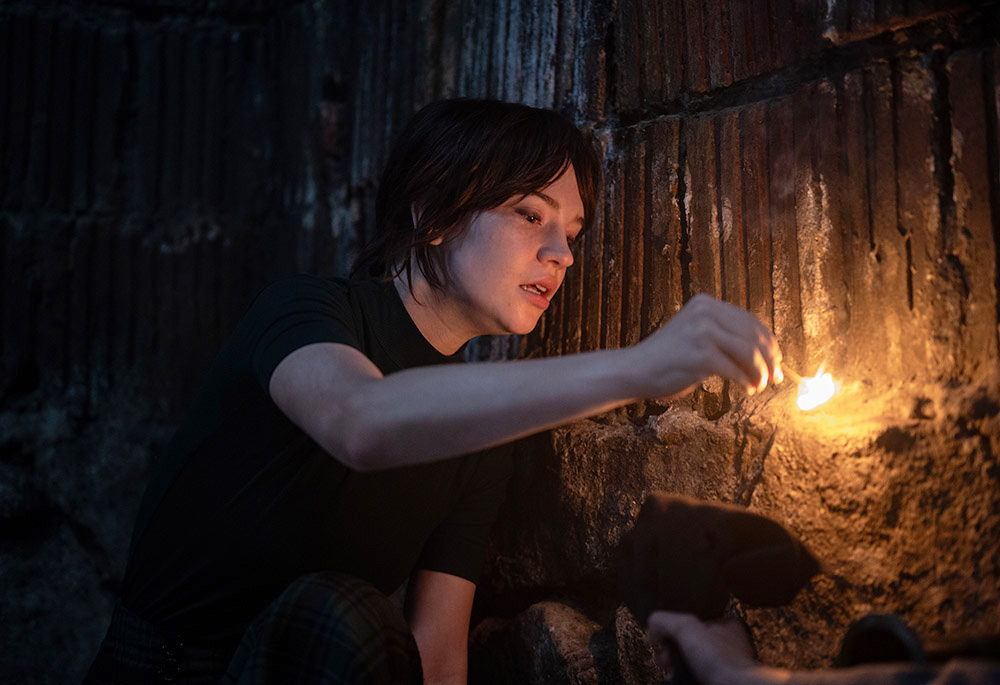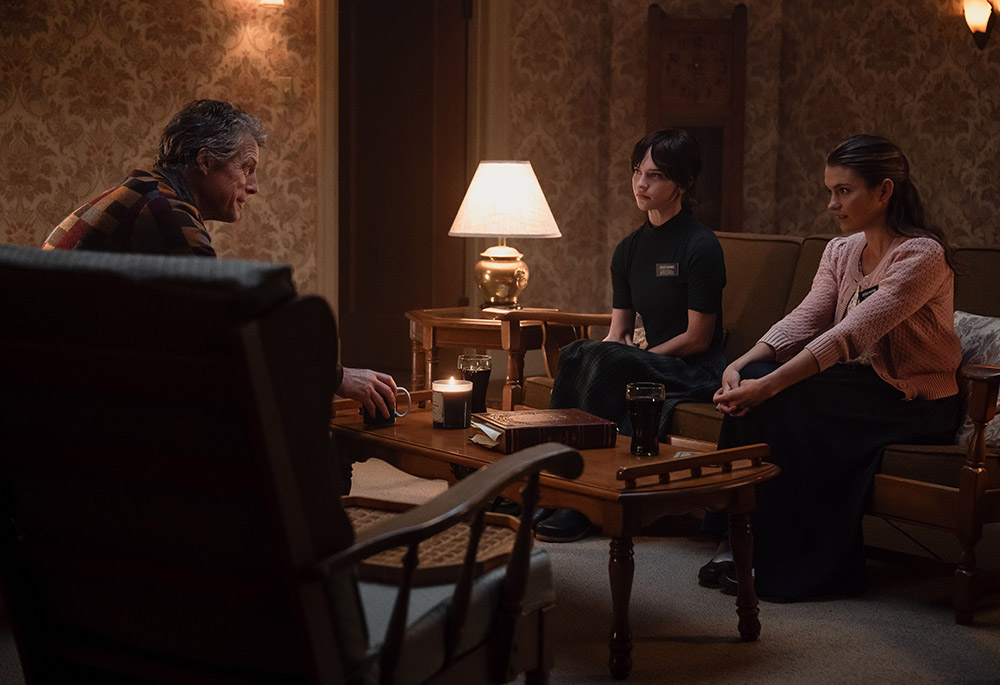
Sophie Thatcher plays Sister Barnes in "Heretic." NCR spoke with Thatcher about the film. (A24 Press)
While the new horror thriller "Heretic" features all the trademarks of its genre – a haunted house, diabolical captor and spine-chilling score – much of its frights come from the theological questions it raises.
When two Mormon missionaries, Sister Barnes (Sophie Thatcher) and Sister Paxton (Chloe East), are invited into the home of Mr. Reed (Hugh Grant), a guise of desire to learn more about the Church of Jesus Christ of Latter-day Saints hides Reed's sinister plan. The young women soon realize that the only way out of this proverbial purgatory is to entertain their host's questions on spirituality and religion.
NCR spoke with actress Sophie Thatcher over Zoom about how her religious background influenced her approach to her character.
This conversation has been edited and condensed for clarity.
NCR: You've previously shared how you view your character, Sister Barnes, as a younger, alternative version of yourself. I'm curious about what you drew from your own backstory as you took on this role and how you also let the character be her own as well.
Thatcher: I think there are so many different kinds of Mormons; I grew up knowing that because I grew up in Chicago, specifically Evanston and also Hyde Park. My community and both sides of my family were Mormon. For Sister Barnes, I leaned into the ways my mom's family sort of moved through the world. They're very artistic and very liberal, so I drew from that.
To play Barnes in this film, I thought about where I was in the church when I was younger. Like Barnes, I was always wearing turtleneck shirts that gave me a different physicality. Being younger, I was a bit more fidgety and there was a lot of nervous laughter. It was interesting to tap into the little habits I had back then and then bring them into the present.
NCR: Some of those regional differences within Mormonism are captured in the dynamic of the two missionaries we see on screen.
Thatcher: Yes, Sister Barnes converted later and grew up with a bit more worldliness. I approached her as being more naturally questioning, a character who knows a little more about other religions besides Mormonism. For Chloe's Paxton character, on the other hand, Mormonism is all she knows. That's what makes their pairing exciting.

In "Heretic," two Mormon missionaries (Sophie Thatcher, center, and Chloe East, right), are invited into the home of Mr. Reed (Hugh Grant). A guise of desire to learn more about the Church of Jesus Christ of Latter-day Saints hides Reed's sinister plan. (A24 Press)
NCR: How did you build a backstory for your character?
Thatcher: I had always thought of Barnes as having an older sister who was estranged and left the church; she's seen the outside world through her sister's "rebellion," and also had this older sister as a guiding and leading figure. Her father died from Lou Gehrig's disease. So yeah, I wrote a backstory in the form of journal entries. It was great to write in the character's voice. Once you do that, saying the lines becomes easier because they make more sense and flow much more naturally.
I imagined a lot of her internal struggle was trying to figure out her voice in her head, how she talks to herself and how she should properly treat herself. You see this in the film but she's very hard on herself, and I relate to that too. I imagined we're meeting her in this film where she's learning to be comfortable in her own body.
NCR: In the film's credits, two Mormon sisters were thanked for the consulting they provided. What other steps did you and the crew take to achieve such religious authenticity?
Thatcher: I asked my mom a lot of specific questions, but Chloe was actually in more direct contact with younger Mormons. A lot of her friends were on missions or had been on missions. It was great to see people my age talk about their work on social media. I wanted to see their point of view and how they presented themselves, to make this as realistic and sensitive as possible.
Advertisement
NCR: Chung-hoon Chung's cinematography work is phenomenal. He loves faces; we see you react to Mr. Reed's words in real time. Was it a challenge to film those scenes when you knew the nuances of your facial expressions would be captured with such detail?
Thatcher: It almost felt like we were filming a play, where you have to be present the entire time and there's no cheating. You have to actively listen because the camera's so close, it sees every blink of an eye and almost sees your thoughts. I knew that if I wasn't listening, the camera would see it. Hugh Grant made it so easy though because he's so engaging and connected to the words he's saying.
Internally, I was doing a lot of mapping with where the character was standing, and what Barnes' opinion was on each point he was bringing up. There's a whole storm of emotions going on and I think writing beforehand from Barnes' point of view helped build that inner dialogue that you see subtly. Those close-ups serve as a check-in for audiences too, because Barnes and Paxton serve as the audience's point of view.
NCR: I've been thinking about "Heretic" in the context of some other great films this year that have explored religion and faith, like "Wildcat" and "Conclave." In interviews I've done with creatives from both of those films, they've shared how they view art-making as an act of faith. Would you say faith has a place in your creative process?
Thatcher: Even though I've disconnected myself in some ways from my Mormon background, because I grew up in it, I've remained open to the spiritual. When I'm creating art or music, when something is resonating or a scene is going well, that almost feels religious to me … there's this "otherness" that you can't explain. When I'm making music, like my album "Pivot & Scrape," I go into this daze-like state where I don't always know what I'm channeling. But something will click and resonate and it feels like a religious experience, like being baptized or being in a church.








